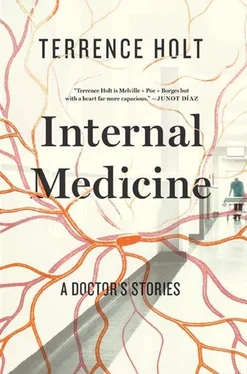And in a flash I knew what was doing it, as certainly as I knew where it would end. The appendicitis was a distraction, irrelevant to the real issue. I knew what had destroyed her liver. I knew it as surely as I knew that, for all practical purposes, A. Crawley was already dead.
I STOOD UP INVOLUNTARILY, impelled by adrenaline. I had no purpose in mind, no notion of anything I could do to change the course of things. It was too late to help A. Crawley; in a jumble of ugly images I imagined what her next few days would be like. Just what I wanted as I stalked toward her room, I had no idea: I wasn’t trying to do anything, or to learn anything as banal as why. I think I just needed to see her.
The door at the end of the hall was ajar, light visible through the opening. I knocked once and went through. The bed in that room is wedged across the far end, the rest of the room a long architectural afterthought. She was awake, her bedding disheveled, the expression on her face inscrutable as she watched me traverse the floor. The boyfriend was not in evidence. The visitor chair was occupied by a well-dressed older woman I took for the mother. With a cursory nod at her, I knelt at the bedside.
“Ms. Crawley,” I said. I tried to sound calm.
“Hi,” she said. She did not giggle, but a smile flirted across her face, turning down at the end.
“How are you feeling?”
“Terrible. Those horrible doctors.”
“What doctors?” I remembered Sara Barnes and her intern. I wondered what they had said to her. If they had seen the labs yet.
The pout became a look of frank distaste. “The surgeons.”
I glanced at her mussed bedclothes and suppressed a smile. The surgical abdominal exam. “Mash on you pretty hard?”
“I thought they were going to cut me right here.” She attempted the smile again.
“Did they tell you—” I began, then stopped.
“Do I really need an operation?”
She looked puzzled, like someone who has been told out of the blue she needs surgery. Nothing more.
I could feel at my back the mother shifting in her chair. I glanced at her. She was leaning forward, worried: her daughter needed an operation.
“Ma’am?” I said finally. The mother cocked her head. “Would you mind excusing us for a moment? I’d like to talk to your daughter.”
The mother, now more worried but that couldn’t be helped, told her daughter she’d be right back, gathered up a large leather purse, and softly closed the door behind her.
I turned back to the patient.
“Ms. Crawley,” I said.
“Yes?” Still — unaccountably, maddeningly — a little coy.
“What did you do?”
The smile faded. Her eyes went elsewhere.
“You know what I’m talking about.”
“No.” She would not look up.
“When did you take it?”
No answer.
“It wasn’t last night, was it?”
No answer.
“When did you take it, Ariel?” I never first-name my patients. But I called her Ariel, and I wasn’t sure if I was pleading or threatening.
Her hand made an angry shoving gesture, pushing a wrinkle across the sheet.
“Ariel, if you don’t tell me, you’re going to die. Do you understand that? You’re going to die. If you want any chance of living past the next three days, you have to tell me what you did.”
As if it matters, I said to myself, in that cynical inner voice that kept me company throughout my residency. But certainly it sounded like it mattered. I realized I was on the verge of shouting. I was shaking with something, some sensation so close to me I couldn’t identify it.
Did I really care? It is in the nature of the house staff to become uncaring (even though, in the hospital, not to care is to be brutal). There is so much death and suffering and grief, and in the midst of it we still need to fill out forms, subject the sick to indignities and pain, try to eat and sleep and keep all these needy people at some kind of distance. When I wasn’t too numb, I worried that I’d stopped caring.
And now I was berating a dying woman because she wouldn’t tell me exactly what she’d done. Maybe I had too many feelings. Or none at all.
She didn’t speak, but she stopped the restless motions of her hands and held still on the bed. I was still as well, and for a long moment neither one of us moved.
“I’m hurting,” she said finally.
Another silence, a vast empty space.
“Where?”
“In here.” She gestured at her abdomen. And then her eyes turned up to meet mine. “Is that what it does?”
I nodded. She dropped her gaze back to the bedsheet, the fingers of her left hand spread over the fabric. A tear fell from her cheek to spot the linen beside her thumb. “I didn’t know,” she said.
Didn’t know what? I wanted to ask, but there were more pressing questions, and I never found out what she didn’t know.
Instead I made her tell me how much Tylenol she had taken. Maybe thirty, maybe forty. She didn’t count. And not the night before. She’d said last night when they’d asked her, but it was Thursday she meant. Thursday night. Her voice was small, emotionless, tired. She had let her secret out, and it was much too late to matter. I think she knew that without being told.
But I had to tell her anyway. I quietly explained to her the difference that day made. It felt much more brutal than shouting. The Tylenol level they had drawn in the ER was just a number. By itself, the number was meaningless. To interpret it, you had to know how much time had elapsed between the taking of the drug and the drawing of the blood. If it had been a matter of a few hours, her level was fine and all was well. If it had been more like thirty hours, then the number they drew was the tail end of a massive overdose.
And perhaps the worst of it was that it didn’t matter: her lie, her silence, made no difference to the story. It wouldn’t have mattered if she had confessed right away. She had come to the hospital too late. The antidote the ED had given, out of its characteristic pessimism, hadn’t been able to help her. Nothing could. The only difference her lie made was to something far outside the realm of medicine.
I knelt there beside her while she sniffled quietly and her shoulders shook.
I’d like to say that I held her, or said soothing words. But I don’t hold female patients, even when they cry, and I had no soothing words. I knelt there and watched her, and struggled to comprehend what I saw.
Ariel was suspended, here, in this room with me, between life and death. Her liver had failed. She would surely die. But just now, and for a while longer, she would lie here on her bed, her belly sore where Sara Barnes had poked it, and cry. She was alive and she was dead, somehow occupying both states at once until the passage of time would collapse them into one. And I knelt at her bed in some paralysis of awe, powerless and hollow at the core.
I HAD FELT THAT sensation once before. Long before I went into medicine, back when I still had hopes of making a living as a writer, my wife and I were invited to a dinner party one oppressively hot Saturday in July. Our host, a pleasant Swiss who taught German at my wife’s college, had prepared a meal of broiled fish preceded by a delicate, steaming soup — the kind of meal only a foreigner would think of preparing on a scorching Summer day. But he was proud of it, and we had the sense to appreciate his cooking, and praised especially the soup, which was the least dense of the evening’s offerings, even if it steamed.
“Wild mushrooms,” he said, explaining the subtle flavor of the broth. “My mother gathered them herself in the Alps.”
“Ah,” we said, and sipped the soup.
That night around two a.m. we both awoke, sharp pains in our bellies and a strange hollow sensation. “The soup,” we said at once, aghast at the possibility even while we laughed and dismissed it, lying down again to sleep. But sleep would not come. By half past two it was clear that something bad was going on, and ten minutes later it was equally clear that we could no longer laugh away the one idea that had seized our imaginations from the moment we had voiced it. I rose from bed to look up the number for poison control.
Читать дальше












